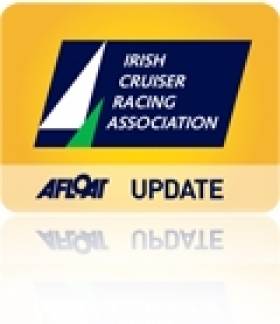Displaying items by tag: ICRA
Light Winds Forecast for Weekend
As thoughts turn towards weekend boating fixtures, it looks like winds – or the lack of them – will be the deciding factor for sailing events. On Dublin Bay forecasters are holding out the prospect of afternoon sea breezes for the weekend's National Cruiser Racer Championships as gradient winds remain light and variable. This morning the meteorological situation is that a light to moderate and moist southwesterly airflow covers the country as high pressure continues to build from the southeast. Met Eireann are giving the following Sea Area forecast.

Forecast for coasts from Mizen Head to Slyne Head to Bloody Foreland
Wind: South to southwest force 3 or 4. Decreasing variable mainly southerly force 2 to 4 this evening or early tonight, strongest for southwest coasts.
Forecast for coasts from Bloody Foreland to Carnsore Point to Mizen Head and the Irish Sea
Wind: South to southwest or variable force 2 to 4, strongest along the east coast and on the Irish Sea. Decreasing variable force 3 or less early tonight.
Weather for all sea areas: Patches of mist, drizzle and fog. Becoming mainly fair later today.
Visibility for all sea areas: Moderate or poor at times, improving mostly good.
Outlook for a further 24 hours until 0600 Saturday 22 May 2010: Light to moderate southerly or variable winds. Fair, apart from drizzle, mist and fog patches.
Mills Designs to the Fore in Commodore's Cup
Yacht designer Mark Mills of Wicklow, the Irish Sailor of the Year, will be represented by at least five sailing designs on three different teams at the next Commodores Cup to be held off Cowes in August. It will be of interest for ICRA members to know that with some teams still being finalized, the tally so far includes the custom IRC 39 Mariners Cove in the Ireland team, Hong Kong returning with the Summit 40 Blondie and the custom 40 Mandrake II (ex Ngoni), and the South Africans joining the event with the Landmark 43 Windpower and the Summit 40 Tokoloshe.
Overnight Sail Repair Service for ICRAs
ICRA members sailing in Dun Laoghaire will be interested to know that North Sails Ireland have announced they are to run an overnight sail repair service during the Liebherr Cruiser Nationals. The service will be run out of the Stena Line ferry terminal in Dun Laoghaire.
Contact details for the North Sails Ireland are available on their website: www.northsails.ie
Second Commodore's Cup Team Not Ruled Out
Cruiser Racer insiders say it looks less positive now that ICRA will manage to produce a second Commodore's Cup team for August but at the same time sailing officials have not given up hope yet. Ireland's single team for August all hails from Crosshaven but yesterday there was still talk of a second team forming. "Clearly boats such as Tiamat, Rockabill and Jump Juice would all be likely candidates" said one source. "What's imperative now is a good performance this weekend [at the ICRA Championships] to show that a second team has got the pace" he added.
ICRA Set Championship Venues til 2014
Buoyed up by Friday's bumper entry the forward thinking Irish Cruiser Racer Association is forging ahead with preparations for the next national sailing championships by announcing venues up to four years in advance. Next year the event is heading south to Royal Cork, the second time it will be staged there. In 2012 it will be staged by Howth Yacht Club. In 2013 it will be held at Tralee Bay SC in Fenit and in 2014 it comes back to Dun Laoghaire, to the Royal Irish Yacht Club.
Antix Wins ICRA's Cork to Dublin Offshore
Cork Harbour saw the start of the feeder race to Dun Laoghaire for the Liebherr ICRA Nationals last Friday writes Claire Bateman. This race was mandatory for yachts wishing to compete in the Commodore's Cup to be held in the Solent in August and also served as a qualifier for any yacht wishing to compete in the Round Ireland Race from Wicklow in June.
This was the first opportunity the Irish team of Anthony O'Leary's Antix, David Dwyer's Marinerscove.ie and Andrew Creighton's Roxy 6 have had to sail together as Roxy, the yacht to fill the Class Three slot, only arrived in Cork Harbour fresh from the Dale-Nelson Yard in Wales two weeks ago.
Start photographs here.
Conditions on Friday night as the yachts came to the start line were magnificent. The harbour was resplendent bathed in brilliant sunlight with yachts from the Friday night Whitesail league flying everywhere in the 12-15knot NNW wind. The feeder race start saw the competitiors beat in the harbour to No.10 buoy where spinnakers were hoisted and they then ran back out the harbour creating a magnificent spectacle as they wove their way through the Whitesail Fleet.
Racing continued throughout the night and most of Saturday with the wind lightening and becoming fluky ranging from 8 to 16 knots providing excellent experience for the crews on the Commodore's Cup yachts. In fact Marinerscove lost out when sailing into a windless area under Wicklow Head and retired at that point but speaking with Dwyer after racing he said that it was nonetheless a wonderful training opportunity with the constant almost hourly sail changes required.
ICRA Offshore Trophy Race:
1. Antix Anthony O'Leary
2. Roxy 6 Rob Davies/Andrew Creighton
3. Gloves Off Kieran Twomey
4. D-Tox Donal O'Leary
Five Boats Fight for ICRA's Offshore Honours
Only five boats came to the line for the inaugural Irish Cruiser Racer Association (ICRA) Offshore Trophy at Crosshaven tonight but what the sailing fleet lacked in numbers it made up for in close competition inside Cork Harbour. Under spinnaker Marinercove.ie (Dave Dwyer) led Antix (Anthony O'Leary) out past Roches Point but only by the narrowest of margins. Also heading for Dublin Bay tonight and next week's ICRA National Championships is Andrew Creighton's brand new Roxy 6, Gloves off and D-Tox. Departing on an ebb tide and 12-knot northerly winds the sailors can expect lighter conditions on the east coast over night. Pictures by Bob Bateman later on the Afloat gallery.

McWilliam May Series Photos Now Online
Plenty of action from Cork Harbour. Photography from Royal Cork's McWilliam series is on the gallery now from Bob Bateman.
Second Race Round Arklow Wind Turbines
The second Metmasts Turbine Race takes place around the Arklow wind farm off the east coast of Ireland on Sunday, June 6th. The 34–mile race is expected to take at least six hours to complete in moderate conditions. Last years inaugural fleet, which featured in August Afloat magazine suffered from lack of wind but nevertheless enjoyed Arklow's legendary hospitality supported by sponsor Metmasts.
French Present Main Challenge for O'Leary in Scotland
In preparation for this year's Commodore's cup ICRA members will be interested to know that France is fielding a strong sailing challenge at the Scottish series in two weeks time which means Royal Cork's Anthony O'Leary will get all the competition he is looking for and more when he arrives on Lough Fyne.
Both French teams will compete in IRC Class 1 at the Brewin Dolphin Scottish Series up against two previous winners of the overall Scottish Series Trophy, Ireland’s Anthony O’Leary on the Ker 39 Antix and three times winner Jonathan Anderson on Playing FTSE.
The magic of the Brewin Dolphin Scottish Series continues to spread into Northern Europe and the premier regatta in the north of Britain has drawn two key French entries among the fleet which is set to muster on Loch Fyne from May 28-31st.
The regatta has become a firm favourite with a small number of French skippers and crews and there have been regular visits from competitors from Brittany and beyond.
In particular, as well as the excellent IRC handicap racing, the French visitors who make the long passage up the Irish Sea enjoy the relaxed ambience of the regatta and this historic, picturesque setting of Tabert which is similar to their native coastline.
In 2008 the overall Scottish Series Trophy went to France for the first time when Gery Trentesaux skippered and steered his La Trinite based Beneteau First 45 to win Class 1. Trentesaux had been one of the most regular visitors from France over the recent history of the Scottish Series. Twice Trenteseaux has captained victorious teams to win the Rolex Commdore’s Cup, the most sought after international offshore racing team Trophy, but he has been a Scottish Series disciple for many years, spreading the word to his compatriots.
Jacques Pelletier is from the same mould as Trenteseaux, a keen offshore racer who enjoys the challenge of travelling to regattas and races which interest him and his crew. He was due to race last year but had to withdraw at the last minute, but raced at Tarbert three times before, most recently in 2008.
He, too, has twice represented France in the Commodore’s Cup. A retired businessman from Paris, Pelletier has done seven Figaro races across the Atlantic.
Newcomers this year are the St Malo based crew of the J122 Nutmeg IV, owned and skippered by Francois Lognone.
“It is the first time we come to Scotland to race but all of our French friends who have already raced in past years at Tarbert always return talking of the magic. So this year we will race, and go on and do a little bit of cruising. We have had the boat for three years, but from St Malo we regularly compete at Cowes Week, the Fastnet and the Round the Island race. But we are not at the same level as Géry Trentesaux!” remarks Lognone.
Ends







































































